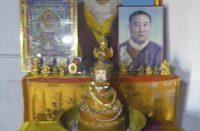High Peaks Pure Earth has translated a blogpost by Woeser written on September 1, 2012 for the Tibetan service of Radio Free Asia and posted on her blog on September 30, 2012.
The blogpost is about Woeser’s journey from Beijing to Lhasa and the difficulties encountered by on the way, caused by being a Tibetan. A similar but longer article by Woeser titled “Checkpoint on the road to Lhasa” was published on October 18, 2012 by The New Statesman.


“Notes From A Trip Back to Lhasa”
By Woeser
On August 12, my husband, Wang Lixiong, and I left Beijing. With us were two artists that were shooting an independent film, Zhu Rikon and Wangwo. Our means of transportation was really cool, an old Cherokee that was still in good conditions.
To get from Beijing to Lhasa you can fly, take the train, drive a car or even cycle. Just like when Mao Zedong’s troops invaded Lhasa on foot while also paving a highway ignorant of any human life, the changes over the past decades have mainly relied on the diversification of the means of transportation as well as the steady stream of people moving into the city. Yet, this stream of people are by no means Tibetan people.
Originally, I did not want to reveal the reason why we were going to Lhasa but the trouble that we encountered on the way became ever more frequent – not only were we closely followed by a police car, at Yangpachen, about 90 km away from Lhasa, we were searched by the police at gunpoint, interrogated, taken away, stopped from travelling on and even made to stay another night, to such an extent that this case was even made public on the internet by worried netizens.
In fact, I had already wanted to go back to Lhasa early this year, but because of one sensitive time or event after the other, I was forced to delay my trip several times. Then finally, when the Beijing Security Bureau issued a notice saying that because the Party’s 18th People’s Congress was about to take place, many people like me were not allowed to stay in Beijing and were only allowed to return upon the completion of the Congress, I was, of course, overjoyed to be able to leave this fortified imperial capital and return to my Lhasa that I had missed so much.
We only asked the Security Bureau for one condition, namely that if we leave Beijing we hope to not be harassed by local authorities on our way to Lhasa or when we are staying in Lhasa.
In reality, however… Or rather, we were faced with another entirely cleared out city: Lhasa.
As we were travelling, I wrote some veiled tweets: “Going home is much more difficult than expected, there exists an invisible web of paradoxes and weirdness… you are an even greater enemy than the enemy, they are altitude sickness worse than altitude sickness. But you cherish the Lama and your memories in your heart, sheltering you from the days of unpredictability, and whenever I think of that, I cannot help but smile to myself.”
I also found out that many of my family members, including my 70-year-old mother, and many friends and relatives had all recently been approached by plain-clothed police for a talk, some of them were even officers from the Beijing Security Bureau that had quickly been sent down to Lhasa. My friends and relatives were all asked to state when they had been in contact with me, they were asked to report the situation after meeting me. And of course, not to mention that after arriving in Lhasa, we were constantly closely followed by two to four cars.
However, this is really not about how I am being ever more heavily guarded. I remember at the first checkpoint on the Qinghai-Tibet Highway, namely the Naijigou checkpoint situated at the exit of Gormo towards Lhasa, the police scrutinised each of our ID cards and shouted out: “Are there any other Tibetans? Tibetans get out of the car, do you have a permit to enter Tibet? If not, you are not allowed to enter Tibet.”
What is a “permit to enter Tibet”? The head of the checkpoint showed me a template of this permit, it belonged to a person called Luo Yong from Lithang in the Kham region who wanted to enter Lhasa to visit his wife who works in the Security Department; it included a criminal record issued by some police office in Lithang County and also a guarantor’s letter with his name and ID card number etc. Of course, this kind of “permit to enter Tibet” would be extremely difficult for Tibetans to obtain.
September 1, 2012, Written on the road to Lhasa





རི་མཐོ་ས་གཙང་ཚང་གི་རླབས་ཆེན་གྱི་བྱ་བར་རྗེས་སུ་ཡི་རངས་ཞུ།
Pingback: High Peaks Pure Earth – “I am Like an Isolated Patient with an Infectious Disease” By Woeser